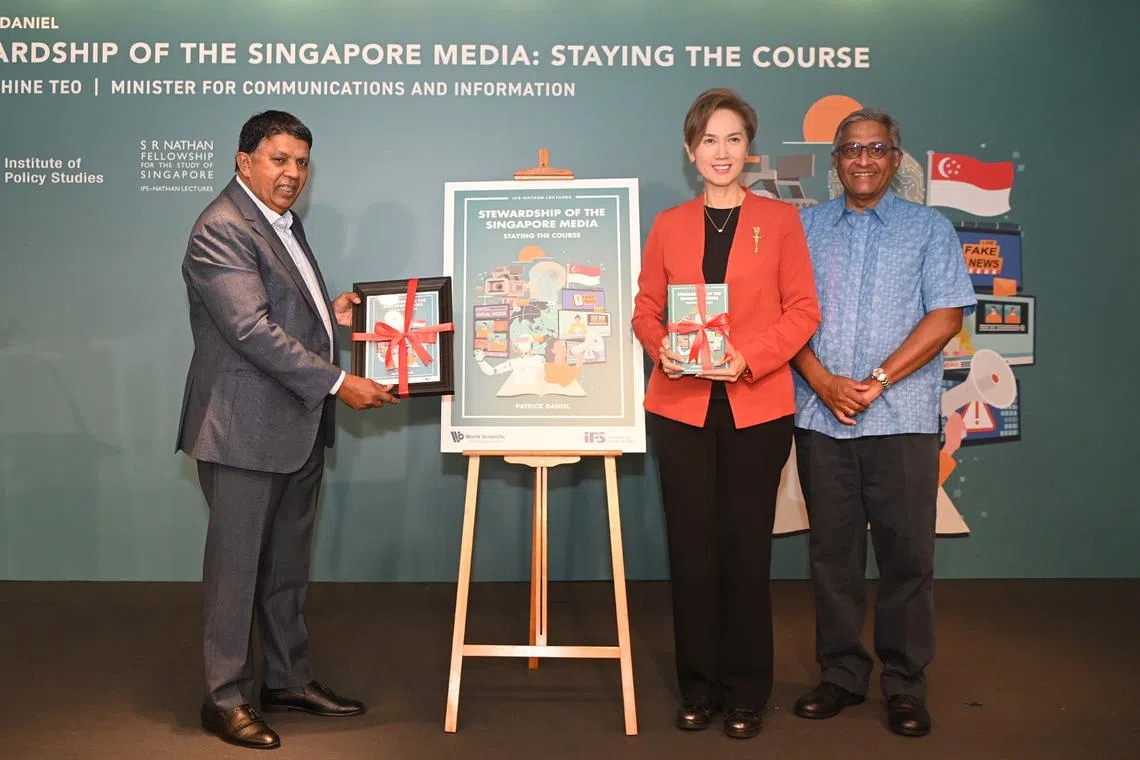Mutual trust and respect vital between Government and media, says Josephine Teo
Sign up now: Get ST's newsletters delivered to your inbox

Minister for Communications and Information Josephine Teo and Institute of Policy Studies director Janadas Devan (right) at the launch of Stewardship Of The Singapore Media: Staying The Course by news veteran Patrick Daniel (left).
ST PHOTO: DESMOND WEE
Follow topic:
SINGAPORE - The relationship between the Government and the media is not without tension, but it is vital that both sides can operate on the basis of mutual trust and respect, said Minister for Communications and Information Josephine Teo at a book launch on Tuesday.
At the heart of the relationship is the significant value the Government places on the role of the media in nation-building, she added, emphasising that this will continue under the fourth-generation (4G) leadership team of the ruling People’s Action Party.
Mrs Teo made the remarks at the launch of Stewardship Of The Singapore Media: Staying The Course, by Mr Patrick Daniel, a news veteran and former interim chief executive officer of SPH Media Trust.
The book is a compilation of the three lectures that Mr Daniel gave in 2022 as the 11th Institute of Policy Studies S R Nathan Fellow for the Study of Singapore
“This relationship has been instrumental throughout our existence as an independent nation. Like all relationships, it is not without tension. It has to be constantly managed, but it has worked,” said the minister.
“Especially in these troubled times with external challenges expected to test our model of governance, the 4G leadership will look to the media to play its role in nation-building and to help unite Singaporeans.”
In the book, Mr Daniel, who was editor of The Business Times for 10 years and later editor-in-chief of the English/Malay/Tamil Media Division of Singapore Press Holdings, recounts the history of Singapore’s media and the development of media laws. He also examines the Government’s active role in the media landscape over the decades, and what he described at the launch as the “good and not-so-good parts” of this stewardship.
At the event on Tuesday held at the Lee Kuan Yew School of Public Policy at the National University of Singapore, he acknowledged the concerns about editorial independence after the restructuring of Singapore Press Holdings’ media business into SPH Media Trust (SMT) in 2021.
But he noted that the Ministry of Communications and Information (MCI) is aware that products that lack credibility are of no use to anyone and will be ignored by audiences. “Thus far, the change to a new funding model has not impacted editorial integrity.”
As a not-for-profit company limited by guarantee, SMT, which publishes The Straits Times and Lianhe Zaobao, among other newspapers and magazines, receives government funding of $180 million annually over five years from 2023.
Mrs Teo said the Government is committed to supporting local media so that news organisations here can “stay the course” and continue to reach the vast majority of Singaporeans amid growing competition for their attention.
“We want local media to thrive and be able to provide high-quality, credible local content to all Singaporeans. This is why we are funding both Mediacorp and SPH Media Trust in their transformation efforts,” she said.
“In return for the Government’s support, our ask of the media companies is to strive towards successful digital transformation and be effective providers of media and news, whether in print, broadcast or through the Internet.”
With rapid changes in the digital realm and social media helping the spread of clickbait and fake news, trusted and credible news media has never been more important, she noted.
Citing the Reuters Institute Digital News Report 2022, she said trust in news media in Singapore at 43 per cent has remained largely stable over the last five years, and is at among the highest levels in the Asia-Pacific region.
The funding will not alter the relationship of mutual trust and respect between the media and the Government, and is meant to ensure that SMT can continue to provide trusted news as a public good, she added.
“We see no value in putting the trust that our legacy media has built with the public at risk. If the products they create lack credibility and are ignored by audiences, it does no one any good,” she said.
Giving an example of how the Government engages the media, she said that during the pandemic, the Multi-Ministry Taskforce on Covid-19 had held regular press conferences on the latest developments and to answer questions from the media, including “tough and inconvenient” questions.
No vital information was withheld from the media or the public, she added.
As a result, the local media was able to reflect the situation accurately, and Singaporeans did not become divided along ideological lines about mask-wearing, vaccinations, or safe-distancing measures, she said.
She noted that this did not mean that journalists saw eye to eye with the Government on all issues.
The fact that there were opinions and editorials published expressing disagreement with the Government shows there was editorial independence, she said.
But the media and the Government operated on the same set of facts, she said.
Mr Daniel, in his remarks at the book launch, said Singapore’s media regime restricts ownership of media companies to ensure that no media barons can emerge to control the press.
This model allows MCI to leave the running of media companies to the management and board and also gives MCI the levers to pull in extreme circumstances, but leaves room for editors and journalists to do their job day to day, he added.
Stewardship Of The Singapore Media: Staying The Course by Patrick Daniel is available at the World Scientific website ( https://www.worldscientific.com/worldscibooks/10.1142/13199#t=aboutBook


